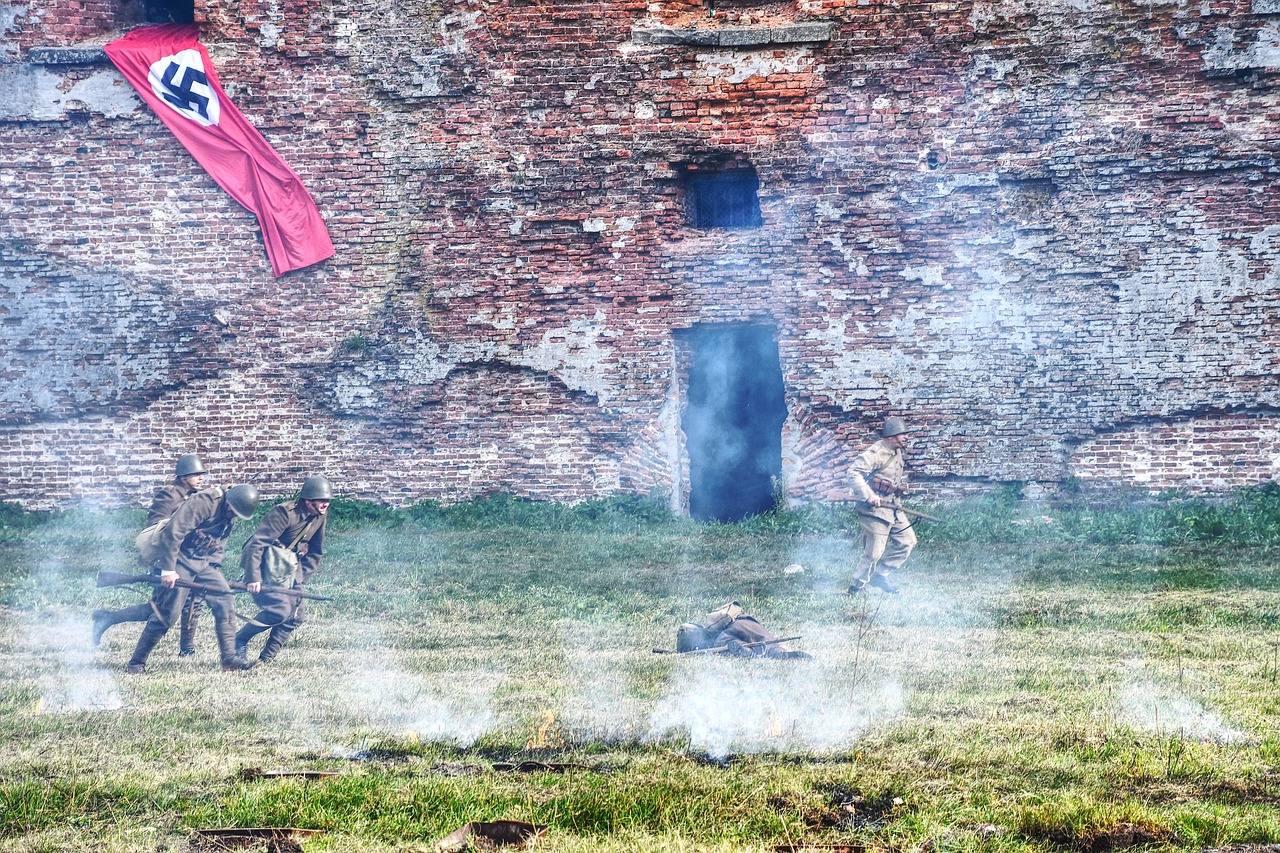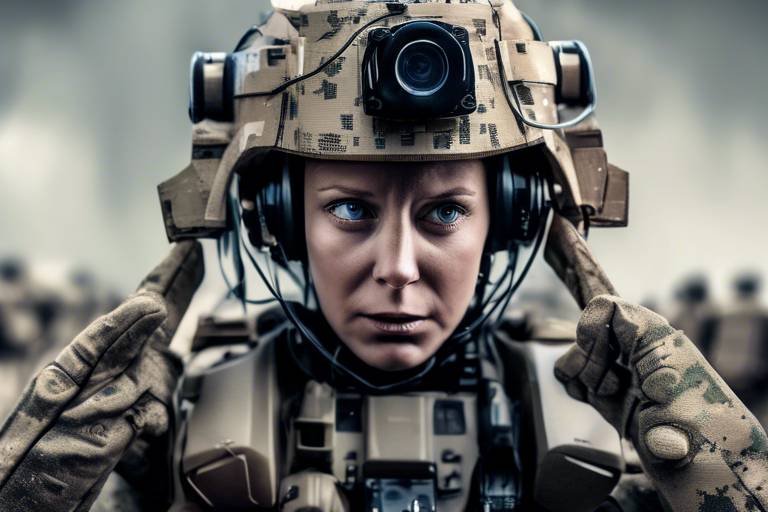The Role of AI in Crisis Management in Defense
In today's fast-paced world, where crises can erupt without warning, the integration of artificial intelligence (AI) into defense strategies is nothing short of revolutionary. Imagine a scenario where military leaders can make lightning-fast decisions based on real-time data analysis, predictive insights, and advanced simulations. That's precisely what AI brings to the table in crisis management. It's not just about having the latest technology; it's about transforming how defense sectors approach emergencies, ensuring that they are not only prepared but can respond effectively when the stakes are highest.
The role of AI in crisis management within defense is multifaceted. From enhancing decision-making processes to optimizing resource allocation, AI is changing the game. Think of AI as a skilled assistant that can sift through mountains of data, identify patterns, and predict outcomes, all in a fraction of the time it would take a human. This capability is crucial during crises, where every second counts, and the wrong decision can have catastrophic consequences.
Moreover, AI's ability to create realistic simulations of potential crisis scenarios allows defense personnel to train under various conditions without the risks associated with real-life training exercises. This not only enhances their preparedness but also instills confidence in their ability to handle emergencies. In essence, AI is not just a tool; it's a partner in ensuring national security.
As we delve deeper into this topic, we will explore the fundamentals of AI in defense, the enhancements it brings to decision-making, the efficiency of resource allocation, and the challenges that come with its implementation. So, buckle up as we embark on this engaging journey into the future of crisis management in defense!
To appreciate the profound impact of AI on crisis management, it's essential to understand what AI is and how it applies specifically to the defense sector. At its core, artificial intelligence refers to the simulation of human intelligence in machines that are programmed to think and learn. In the context of defense, AI can analyze vast datasets from various sources, including satellite imagery, social media, and intelligence reports, to provide actionable insights.
AI's potential to transform traditional crisis management methodologies is immense. For instance, during a natural disaster, AI can analyze weather patterns, assess damage through aerial imagery, and even predict the movement of affected populations. This information is invaluable for defense forces, enabling them to allocate resources efficiently and respond effectively. The integration of AI into defense systems is not merely an enhancement; it represents a paradigm shift in how crises are managed and resolved.
One of the most significant advantages of AI in crisis management is its ability to enhance decision-making processes. During a crisis, decision-makers are often inundated with information, and the sheer volume can be overwhelming. This is where AI shines. By quickly analyzing vast amounts of data, AI can provide actionable insights that help leaders make informed decisions rapidly.
Consider a scenario where a military unit is responding to a terrorist threat. AI systems can process real-time data from various sources—such as surveillance drones, social media feeds, and intelligence reports—allowing defense teams to make informed decisions swiftly. This capability is crucial for effective management and response, as it ensures that the right actions are taken at the right time.
Another fascinating aspect of AI is its use of predictive analytics. By identifying patterns and trends in historical data, AI can forecast potential crises before they escalate. For example, if an area shows signs of rising tensions, AI can alert defense forces, allowing them to prepare and mitigate risks proactively. This proactive approach can save lives and resources, making it a game-changer in crisis management.
AI-powered simulations are also invaluable. They create various crisis scenarios, helping defense personnel train effectively and develop strategies to counteract potential threats in a controlled environment. Imagine a training exercise where soldiers can practice responding to a simulated cyber-attack or a hostage situation, all designed by AI to mimic real-world challenges. This level of preparation can significantly enhance a unit's readiness and effectiveness in actual crises.
AI doesn't just enhance decision-making; it also optimizes resource allocation during crises. By analyzing needs and availability, AI ensures that personnel and equipment are deployed where they are most needed for maximum impact. For instance, during a humanitarian crisis, AI can assess the most affected areas and direct resources accordingly, ensuring that aid reaches those who need it most.
Despite its many benefits, implementing AI in defense is not without challenges. Issues such as ethical considerations, data privacy, and cybersecurity risks must be addressed to ensure that AI is used responsibly and effectively.
The use of AI in defense raises important ethical questions. Who is accountable for decisions made by AI systems? What happens if an AI system makes a mistake? These questions highlight the need for clear guidelines and oversight when integrating AI into defense strategies. It's crucial to strike a balance between leveraging AI's capabilities and maintaining human oversight to ensure accountability.
Additionally, integrating AI systems in defense increases vulnerability to cyber threats. As AI becomes more prevalent, it is essential to implement stringent cybersecurity protocols to protect sensitive information and maintain operational integrity. After all, a well-designed AI system is only as strong as the security measures that protect it.
- What is the primary role of AI in crisis management in defense?
AI enhances decision-making, resource allocation, and response strategies during emergencies. - How does AI improve decision-making in crises?
AI analyzes vast amounts of data quickly, providing actionable insights and predicting potential outcomes. - What are the ethical concerns regarding AI in defense?
Ethical concerns include decision-making autonomy, accountability, and the implications of relying on machines. - What are the cybersecurity risks associated with AI?
AI systems can be vulnerable to cyber threats, necessitating robust cybersecurity measures.

Understanding AI in Defense
This article explores how artificial intelligence is revolutionizing crisis management within defense sectors, enhancing decision-making, resource allocation, and response strategies during emergencies.
Artificial Intelligence (AI) is not just a buzzword; it’s a game-changer in the defense sector. Imagine having the ability to process mountains of data in mere seconds, predicting crises before they even happen, and optimizing resources to ensure that every soldier and piece of equipment is deployed where it's needed the most. That’s the power of AI in defense! It’s like having a super-smart assistant who can analyze all the information you throw at it, helping you make decisions that could save lives and protect nations.
So, what exactly is AI? In simple terms, AI refers to the simulation of human intelligence in machines that are programmed to think and learn like humans. This technology is being harnessed in various ways within defense, from enhancing surveillance systems to improving logistics and operational planning. The potential applications are vast, and they’re transforming traditional crisis management methodologies into something much more dynamic and responsive.
To truly grasp how AI is shaping the defense landscape, let’s break down its core components:
- Machine Learning: This subset of AI allows systems to learn from data and improve over time without being explicitly programmed. It’s like teaching a child to ride a bike; they learn from their falls and eventually become experts.
- Natural Language Processing (NLP): NLP enables machines to understand and interpret human language, making communication between AI systems and defense personnel seamless. Think of it as giving a voice to your computer that understands your commands.
- Computer Vision: This technology allows machines to interpret and make decisions based on visual data. It’s akin to giving AI eyes, enabling it to recognize threats in real-time.
These components work together to create a robust framework that enhances situational awareness and decision-making capabilities. For instance, AI can analyze satellite imagery to detect unusual activities or movements, providing military leaders with vital intelligence that can inform their strategies. The ability to sift through and analyze this information quickly is essential in crisis management, where every second counts.
Moreover, AI’s role in defense extends beyond just analysis. It is also pivotal in automating mundane tasks, allowing human personnel to focus on more critical decision-making processes. Imagine a world where drones can be deployed automatically to assess damage after a natural disaster, or where logistics systems can predict supply shortages and reroute resources accordingly. AI makes all of this possible, streamlining operations and enhancing overall efficiency.
As we delve deeper into the implications of AI in crisis management, it’s crucial to recognize that while the technology offers incredible advantages, it also comes with its set of challenges. But that’s a topic for another section. For now, let’s appreciate the transformative power of AI in defense and how it’s reshaping our approach to crisis management.
- What is AI in defense? AI in defense refers to the application of artificial intelligence technologies to enhance military operations, decision-making, and crisis management.
- How does AI improve decision-making in crises? AI processes vast amounts of data quickly, providing actionable insights and predicting potential outcomes to enhance strategic responses.
- What are some challenges of implementing AI in defense? Challenges include ethical considerations, data privacy issues, and the need for robust cybersecurity measures to protect sensitive information.

AI-Driven Decision Making
In the fast-paced world of crisis management within defense, the ability to make quick and informed decisions can mean the difference between success and failure. This is where the power of artificial intelligence (AI) comes into play, revolutionizing how defense teams approach critical situations. Imagine having a super-intelligent assistant that can sift through mountains of data in the blink of an eye, pinpointing crucial information that human analysts might miss. That's the essence of AI-driven decision making.
AI enhances decision-making processes in crisis situations by analyzing vast amounts of data quickly. By employing advanced algorithms, AI systems can identify patterns, trends, and anomalies that provide actionable insights. For instance, during a natural disaster, AI can analyze weather patterns, social media feeds, and emergency response logs to help commanders understand the situation on the ground. This capability allows defense teams to respond more effectively and efficiently, making decisions based on real-time information rather than outdated reports.
One of the most significant advantages of AI is its ability to process real-time data from various sources. In a crisis, every second counts, and having access to up-to-date information is crucial for effective management and response. AI systems can integrate data from sensors, drones, and satellite imagery, providing a comprehensive view of the situation. This means that defense personnel can make informed decisions rapidly, adapting their strategies as new information becomes available. For example, if a threat level rises unexpectedly, AI can alert commanders instantly, allowing them to adjust their response plans accordingly.
Another powerful tool in AI's arsenal is predictive analytics. By analyzing historical data and identifying patterns, AI can forecast potential crises before they escalate. Imagine a defense team being able to anticipate a cyber-attack or a natural disaster based on trends and signals from previous events. This foresight allows defense forces to prepare and mitigate risks in advance, ultimately saving lives and resources. Predictive analytics can also inform training programs, ensuring that personnel are equipped with the skills needed to handle emerging threats.
Training is an essential aspect of crisis management, and AI-powered simulations play a pivotal role in this area. By creating various crisis scenarios, AI helps defense personnel train effectively and develop strategies to counteract potential threats in a controlled environment. These simulations can mimic real-world conditions, allowing teams to practice their responses without the risks associated with actual crises. For example, a simulation might involve a terrorist attack scenario where teams must coordinate their response, assess the situation, and deploy resources effectively. This kind of training not only improves readiness but also fosters teamwork and communication among personnel.
In conclusion, AI-driven decision making is transforming how defense sectors approach crisis management. By harnessing the power of real-time data analysis, predictive analytics, and scenario simulations, AI enables defense teams to make informed and timely decisions. This not only enhances the effectiveness of their responses but also ultimately saves lives and resources. As we continue to integrate AI into our defense strategies, the potential for improved crisis management is boundless.
- How does AI improve decision-making in defense? AI analyzes large datasets quickly, providing actionable insights that help defense teams make informed decisions during crises.
- What is predictive analytics in the context of AI? Predictive analytics uses historical data to forecast potential crises, allowing defense forces to prepare and mitigate risks before they escalate.
- Can AI simulations replace real-life training? While AI simulations provide valuable training opportunities, they are designed to complement real-life training, not replace it.
- What are the challenges of implementing AI in defense? Challenges include ethical considerations, data privacy concerns, and the need for robust cybersecurity measures to protect sensitive information.

Real-Time Data Analysis
In today's fast-paced world, the ability to make quick and informed decisions is crucial, particularly in defense scenarios where lives are at stake. That's where comes into play. Imagine a defense team on the ground, faced with a sudden crisis. They need to assess the situation, gather information, and respond effectively—all within moments. AI technology allows them to analyze vast amounts of data from multiple sources almost instantaneously, transforming the way crises are managed.
Real-time data analysis harnesses a variety of inputs, including satellite imagery, social media feeds, and sensor data from the field. By integrating these diverse data streams, AI algorithms can identify trends and anomalies that human analysts might overlook. For instance, if there's a sudden spike in social media chatter about a potential threat, AI can flag this for further investigation, allowing defense teams to act before a situation escalates.
Furthermore, the use of AI in real-time data analysis can significantly enhance situational awareness. Defense personnel can visualize complex data through intuitive dashboards, making it easier to interpret information quickly. These dashboards can display critical metrics such as troop movements, resource availability, and emerging threats, all in one place. This holistic view empowers commanders to make decisions based on the most accurate and up-to-date information available.
One of the most fascinating aspects of real-time data analysis is its ability to adapt and learn. AI systems continuously improve their algorithms by analyzing past data and outcomes, refining their predictions over time. This adaptive learning means that as the defense forces encounter new types of crises, their AI systems become more adept at recognizing patterns and suggesting effective responses.
To illustrate the impact of real-time data analysis in crisis management, consider the following table that summarizes its key benefits:
| Benefit | Description |
|---|---|
| Speed | AI processes data in seconds, enabling rapid decision-making. |
| Accuracy | Reduces human error by analyzing data through advanced algorithms. |
| Comprehensive Insights | Integrates multiple data sources for a holistic view of the situation. |
| Predictive Capabilities | Forecasts potential threats and outcomes based on historical data. |
In conclusion, real-time data analysis powered by AI is not just a technological advancement; it is a game-changer in defense crisis management. By enabling faster, more accurate, and comprehensive decision-making, AI equips defense teams with the tools they need to respond effectively to emergencies. As we continue to navigate an increasingly complex world, the integration of AI into defense operations will only become more essential.
- What is real-time data analysis? Real-time data analysis refers to the process of continuously inputting and analyzing data as it becomes available, allowing for immediate insights and responses.
- How does AI improve decision-making in defense? AI enhances decision-making by quickly processing large volumes of data, identifying patterns, and providing actionable insights that inform strategic responses.
- What types of data are used in real-time analysis? Data sources can include satellite imagery, social media, sensor data, and other relevant information that can aid in crisis management.
- Are there risks associated with using AI in defense? Yes, there are challenges such as ethical considerations, data privacy, and cybersecurity risks that need to be addressed when implementing AI in defense.

Predictive Analytics
In the realm of crisis management, stands out as a game-changer, leveraging the power of artificial intelligence to foresee potential crises before they unfold. Imagine having a crystal ball that not only tells you what might happen next but also guides you on how to prepare for it. This is precisely what predictive analytics achieves. By analyzing historical data and identifying patterns, AI can forecast future events, allowing defense forces to take proactive measures rather than reactive ones. This shift from a reactive to a proactive approach is crucial in ensuring the safety and security of nations.
For instance, consider a scenario where a country faces the threat of natural disasters, such as hurricanes or floods. Predictive analytics can analyze weather patterns, historical data on past disasters, and even social media trends to predict when and where a disaster might strike. By doing so, defense teams can mobilize resources, evacuate vulnerable populations, and implement safety measures well in advance, significantly reducing the potential impact of the crisis.
Moreover, predictive analytics is not limited to natural disasters; it plays a vital role in national security as well. By examining data from various sources, including intelligence reports, social media, and satellite imagery, AI can identify potential threats, such as terrorist activities or military movements. This capability allows defense agencies to allocate resources effectively and devise strategies to counteract these threats before they escalate into actual crises.
To illustrate the impact of predictive analytics in defense, consider the following table that summarizes its key benefits:
| Benefit | Description |
|---|---|
| Proactive Preparedness | Allows defense forces to prepare for crises before they occur, minimizing damage and loss. |
| Resource Optimization | Ensures that resources are allocated efficiently based on predicted needs. |
| Enhanced Decision-Making | Provides actionable insights that improve strategic responses during crises. |
| Risk Mitigation | Identifies potential risks early, allowing for timely interventions to prevent escalation. |
As we delve deeper into this fascinating world of predictive analytics, it's essential to recognize that the technology is not infallible. While AI can provide valuable insights, it relies heavily on the quality and accuracy of the data it processes. Inaccurate or biased data can lead to flawed predictions, which can have serious consequences in crisis management. Therefore, it is crucial for defense agencies to maintain high standards of data integrity and to continually refine their predictive models.
In conclusion, predictive analytics is revolutionizing how defense sectors approach crisis management. By anticipating potential threats and enabling proactive responses, AI not only enhances the effectiveness of defense strategies but also plays a crucial role in safeguarding lives and resources. As technology continues to evolve, the integration of predictive analytics into defense operations will undoubtedly become more sophisticated, paving the way for a safer future.
- What is predictive analytics?
Predictive analytics is a branch of advanced analytics that uses historical data, statistical algorithms, and machine learning techniques to identify the likelihood of future outcomes based on historical data.
- How does AI improve crisis management?
AI enhances crisis management by providing real-time data analysis, predictive insights, and resource optimization, enabling defense teams to respond more effectively during emergencies.
- What are the challenges of implementing AI in defense?
Challenges include ethical considerations, data privacy concerns, and the need for robust cybersecurity measures to protect sensitive information.

Scenario Simulation
In the realm of defense, stands out as a groundbreaking application of artificial intelligence. Imagine being able to prepare for a crisis before it even happens! AI-powered simulations allow defense personnel to engage in virtual environments where they can encounter various crisis situations, ranging from natural disasters to military conflicts. This immersive approach not only enhances training but also equips teams with the tools to devise effective strategies in real-time.
What makes scenario simulations so powerful? They provide a safe space for defense forces to experiment with different tactics and responses without the risk of real-world consequences. By recreating potential crisis scenarios, AI can help identify the most effective methods for addressing threats, allowing teams to refine their strategies based on data-driven insights. For instance, a military unit could simulate a hostage situation, testing various negotiation techniques and tactical responses, all while analyzing the outcomes to improve future performance.
Furthermore, these simulations can be tailored to reflect specific environments and challenges that personnel may face. By incorporating real-world data and variables, AI can generate scenarios that mirror actual conditions, making the training experience even more relevant. This adaptability means that defense teams can continuously evolve their skills and strategies, staying one step ahead of potential adversaries.
Additionally, scenario simulations can be utilized for cross-agency collaboration. When different branches of the military or various defense organizations come together for joint exercises, AI can create integrated simulations that require teamwork and coordination. This fosters communication and understanding among diverse units, which is vital during actual crises.
To illustrate the impact of scenario simulations, consider the following table showcasing key benefits:
| Benefit | Description |
|---|---|
| Enhanced Training | Provides realistic environments for defense personnel to practice and refine their skills. |
| Data-Driven Insights | Utilizes analytics to inform strategy development and improve decision-making. |
| Risk-Free Environment | Allows for experimentation without real-world consequences, promoting innovation. |
| Inter-Agency Collaboration | Facilitates joint exercises, improving communication and coordination among different defense units. |
In conclusion, scenario simulation powered by AI is not just a tool; it’s a revolutionary approach that transforms how defense organizations prepare for crises. By enabling realistic training and fostering strategic thinking, these simulations help ensure that defense personnel are ready to tackle any challenge that comes their way. With the potential to save lives and resources, the importance of integrating scenario simulation into defense training cannot be overstated.
- What is scenario simulation in defense?
Scenario simulation is the use of AI to create virtual environments where defense personnel can practice responding to various crisis situations, allowing them to refine their strategies and improve their decision-making skills. - How does AI enhance scenario simulations?
AI enhances scenario simulations by providing real-time data analysis, creating realistic scenarios based on actual conditions, and offering data-driven insights that inform strategic responses. - Can scenario simulations be used for joint training exercises?
Yes, scenario simulations can facilitate joint training exercises among different branches of the military or various defense organizations, improving inter-agency collaboration and communication.

Resource Allocation Efficiency
In the high-stakes world of defense, the efficient allocation of resources can mean the difference between success and failure during a crisis. Imagine a scenario where every second counts, and crucial decisions need to be made swiftly. This is where artificial intelligence (AI) shines, transforming how defense teams manage their resources. By leveraging advanced algorithms and data analysis, AI systems can assess the needs on the ground and the availability of assets, ensuring that personnel and equipment are deployed in the most effective manner possible.
One of the primary ways AI enhances resource allocation is through real-time analytics. AI systems constantly analyze incoming data from various sources—such as satellite imagery, social media, and sensor networks—to create a dynamic picture of the situation at hand. This enables commanders to pinpoint where support is needed most urgently, whether it's deploying medical teams to a disaster area or reallocating military assets to counteract a threat. The ability to respond to evolving situations in real-time is invaluable in crisis management.
Moreover, AI can optimize logistics by predicting the necessary resources based on historical data and current trends. For instance, if a natural disaster is predicted, AI can forecast the types and quantities of supplies that will be needed, from food and water to medical equipment and shelter materials. This predictive capability allows defense organizations to stockpile essential resources ahead of time, reducing response times and enhancing overall readiness.
To illustrate the impact of AI on resource allocation, consider the following table that outlines various AI applications and their benefits:
| AI Application | Benefit |
|---|---|
| Real-Time Data Processing | Enables quick decision-making based on current situations. |
| Predictive Analytics | Forecasts needs and optimizes resource distribution. |
| Logistics Management | Streamlines supply chains and reduces waste. |
| Scenario Planning | Prepares teams for various potential crisis situations. |
Furthermore, AI facilitates collaboration among different defense units. By creating a centralized platform where information can be shared seamlessly, AI ensures that all parties involved in crisis management are on the same page. This level of coordination is crucial, especially in large-scale operations where multiple teams may be deployed across various locations.
However, while the advantages of AI in resource allocation are clear, it’s essential to recognize that technology should complement human decision-making rather than replace it. AI can provide insights and recommendations, but the final call often requires human judgment, especially in complex and nuanced situations.
- How does AI improve resource allocation in defense?
AI enhances resource allocation by analyzing real-time data to determine where resources are most needed, optimizing logistics, and predicting future needs based on historical patterns. - What are the risks associated with using AI for resource allocation?
While AI offers many benefits, risks include over-reliance on technology, potential data breaches, and the ethical implications of automated decision-making. - Can AI completely replace human decision-making in crisis management?
No, AI should complement human decision-making. While it provides valuable insights, human judgment is crucial for navigating complex scenarios.

Challenges in AI Implementation
As we dive deeper into the realm of artificial intelligence (AI) within the defense sector, it becomes apparent that while the advantages are significant, there are also considerable challenges that must be navigated. Implementing AI is not just about integrating new technology; it involves a complex interplay of ethical, operational, and security considerations. One of the foremost challenges is the ethical implications surrounding AI's role in decision-making. When machines are involved in critical defense operations, questions arise about autonomy and accountability. Who is responsible if an AI system makes a flawed decision that leads to disastrous consequences? This is not merely a theoretical question; it's a pressing issue that defense organizations must address as they incorporate AI into their frameworks.
Moreover, the reliance on AI introduces a layer of complexity regarding data privacy. Defense operations often involve sensitive information that, if compromised, could have dire implications. With AI systems analyzing vast amounts of data, the potential for data breaches increases. Organizations must ensure that they have robust protocols in place to protect this information from cyber threats, which leads us to another significant challenge: cybersecurity. The integration of AI technologies in defense makes systems more susceptible to cyberattacks, necessitating a reevaluation of existing security measures. Defense teams must not only focus on the operational capabilities of AI but also invest in cybersecurity solutions that can safeguard against potential vulnerabilities.
Furthermore, the implementation of AI in defense is often hindered by resource limitations. Developing and maintaining advanced AI systems requires substantial financial investment, skilled personnel, and ongoing training. Many defense organizations may find themselves constrained by budgetary limitations, which can impede the adoption of cutting-edge technologies. This is particularly challenging in a rapidly evolving technological landscape where staying ahead of potential threats is crucial.
Lastly, there is the challenge of cultural resistance within defense organizations. Change is often met with skepticism, and the introduction of AI can provoke fears about job displacement or a loss of human oversight in critical situations. To overcome this, organizations must foster a culture that embraces innovation and emphasizes the complementary role of AI in enhancing human decision-making rather than replacing it. This requires ongoing education and transparent communication about the benefits and limitations of AI technologies.
- What are the main ethical concerns regarding AI in defense? The primary ethical concerns include decision-making autonomy, accountability for AI actions, and the potential consequences of relying on machines for critical operations.
- How does AI impact data privacy in defense? AI systems process large amounts of sensitive data, raising concerns about data breaches and the need for stringent privacy protections.
- What cybersecurity measures are necessary for AI in defense? Organizations must implement robust cybersecurity protocols to protect AI systems from potential cyber threats and ensure operational integrity.
- How can defense organizations address cultural resistance to AI? By fostering an innovative culture and providing education about AI's role in enhancing human capabilities, organizations can mitigate fears and encourage acceptance.

Ethical Considerations
As we dive into the world of artificial intelligence (AI) in defense, it's essential to address the that come along with this powerful technology. The integration of AI into crisis management is not just about enhancing efficiency and effectiveness; it also raises significant questions about autonomy, accountability, and the potential consequences of relying on machines for critical decision-making.
One of the primary concerns is the autonomy of AI systems. When machines are tasked with making decisions during crises, who is ultimately responsible for those decisions? If an AI system misjudges a situation and leads to unintended consequences, can we hold the developers, the military, or the machines themselves accountable? This dilemma is akin to a double-edged sword; while AI can process data faster than any human can, the lack of human judgment in nuanced situations can lead to catastrophic errors.
Furthermore, the reliance on AI in defense operations raises questions about moral responsibility. For instance, if an AI system determines that a particular course of action is necessary, but that action results in loss of life, how do we reconcile the ethical implications of that decision? The human element in crisis management is crucial, and the fear is that as we hand over more control to AI, we may inadvertently strip away the moral compass that guides our actions.
Another vital aspect to consider is data privacy. AI systems require vast amounts of data to function effectively, and in the defense sector, this data often includes sensitive information. The collection, storage, and processing of such data must adhere to strict ethical standards to prevent misuse. Imagine a scenario where personal data is compromised or used inappropriately; the ramifications could be severe, not just for individuals but for national security as well.
Moreover, there is an ongoing debate regarding the transparency of AI algorithms. Many AI systems operate as "black boxes," where their decision-making processes are not easily understood, even by their creators. This lack of transparency can lead to distrust among the public and within the defense community itself. It's crucial that AI systems are designed with explainability in mind, ensuring that their operations can be scrutinized and understood, which is essential for maintaining trust.
In conclusion, while the potential of AI in crisis management is immense, we must tread carefully. The ethical considerations surrounding its use are complex and multifaceted. As we continue to explore the integration of AI in defense, it is imperative that we establish robust frameworks to address these ethical dilemmas. Only then can we harness the true power of AI while safeguarding our moral and ethical responsibilities.
- What are the main ethical concerns regarding AI in defense? The main concerns include autonomy, accountability, data privacy, and transparency.
- How can we ensure accountability in AI decision-making? Establishing clear guidelines and frameworks for AI use, along with human oversight, can help ensure accountability.
- What role does data privacy play in AI implementation? Protecting sensitive data is crucial to prevent misuse and maintain trust in defense operations.
- Why is transparency important in AI systems? Transparency fosters trust and allows for scrutiny of AI decision-making processes.

Cybersecurity Risks
This article explores how artificial intelligence is revolutionizing crisis management within defense sectors, enhancing decision-making, resource allocation, and response strategies during emergencies.
This section delves into the fundamentals of artificial intelligence and its specific applications in defense, highlighting its potential to transform traditional crisis management methodologies.
AI enhances decision-making processes in crisis situations by analyzing vast amounts of data quickly, providing actionable insights, and predicting potential outcomes to improve strategic responses.
AI systems can process real-time data from various sources, enabling defense teams to make informed decisions rapidly during crises, which is crucial for effective management and response.
Using predictive analytics, AI can forecast potential crises by identifying patterns and trends, allowing defense forces to prepare and mitigate risks before they escalate.
AI-powered simulations create various crisis scenarios, helping defense personnel train effectively and develop strategies to counteract potential threats in a controlled environment.
AI optimizes resource allocation during crises by analyzing needs and availability, ensuring that personnel and equipment are deployed where they are most needed for maximum impact.
While AI offers significant benefits, there are challenges in its implementation within defense, including ethical considerations, data privacy, and the need for robust cybersecurity measures.
The use of AI in defense raises ethical questions about decision-making autonomy, accountability, and the implications of relying on machines in critical situations.
Integrating AI systems into defense operations brings a host of that cannot be overlooked. As defense agencies increasingly rely on AI for critical decision-making and operational efficiency, they also expose themselves to vulnerabilities that can be exploited by malicious actors. The interconnectedness of AI systems means that a single breach can compromise the entire network, leading to catastrophic consequences.
One of the primary risks associated with AI in defense is the potential for data breaches. Sensitive information, including strategic plans and personnel details, can be targeted by hackers. If this information falls into the wrong hands, it could severely undermine national security. Moreover, AI systems themselves can be manipulated, leading to incorrect decisions based on altered data inputs.
Additionally, the complexity of AI algorithms presents another layer of risk. These algorithms, while designed to improve efficiency, can also introduce biases or errors if not properly monitored. For example, if an AI system misinterprets data due to a flaw in its programming, it could lead to poor decision-making during a crisis, potentially exacerbating the situation instead of resolving it.
To mitigate these risks, defense organizations must implement stringent cybersecurity protocols. This includes:
- Regular security audits to identify vulnerabilities.
- Robust encryption methods to protect sensitive data.
- Comprehensive training for personnel on cybersecurity best practices.
- Continuous monitoring of AI systems for unexpected behavior.
By prioritizing cybersecurity, defense agencies can harness the power of AI while safeguarding against the threats that accompany its integration.
Q1: What are the main benefits of using AI in crisis management for defense?
A1: AI enhances decision-making, improves resource allocation, and enables real-time data analysis, which collectively lead to more effective crisis management.
Q2: What are the ethical concerns related to AI in defense?
A2: Ethical concerns include issues of accountability, the potential for biased decision-making, and the implications of relying on machines for critical decisions.
Q3: How can defense organizations protect against cybersecurity risks associated with AI?
A3: Implementing robust cybersecurity protocols, conducting regular security audits, and training personnel on best practices are essential steps to mitigate risks.
Frequently Asked Questions
- What is the role of AI in defense crisis management?
AI plays a crucial role in defense crisis management by enhancing decision-making, optimizing resource allocation, and providing real-time data analysis. It enables defense teams to respond swiftly and effectively during emergencies, transforming traditional methodologies into more efficient practices.
- How does AI improve decision-making during crises?
AI improves decision-making by rapidly analyzing vast amounts of data and providing actionable insights. With predictive analytics, AI can forecast potential crises, allowing defense forces to prepare in advance and mitigate risks effectively before they escalate.
- What are the benefits of real-time data analysis in defense?
Real-time data analysis allows defense teams to make informed decisions quickly, which is essential during crises. By processing information from various sources, AI helps identify immediate needs and potential threats, facilitating a more coordinated and efficient response.
- Can AI simulate crisis scenarios for training purposes?
Absolutely! AI-powered simulations can create various crisis scenarios, enabling defense personnel to train effectively. This controlled environment helps them develop and refine strategies to counteract potential threats, enhancing their preparedness for real-world situations.
- What challenges does AI face in defense implementation?
While AI has significant advantages, it also faces challenges such as ethical considerations surrounding decision-making autonomy, data privacy issues, and the need for robust cybersecurity measures to protect sensitive information from potential cyber threats.
- How do ethical considerations impact AI in defense?
Ethical considerations are critical when implementing AI in defense, as they raise questions about accountability and the implications of machine reliance in critical decisions. It's essential to address these issues to ensure responsible and ethical use of AI technologies.
- What cybersecurity risks are associated with AI in defense?
Integrating AI systems in defense increases vulnerability to cyber threats. This necessitates stringent cybersecurity protocols to safeguard sensitive data and maintain operational integrity, ensuring that AI systems are not exploited by malicious actors.



















